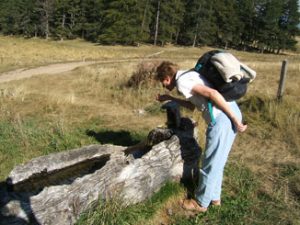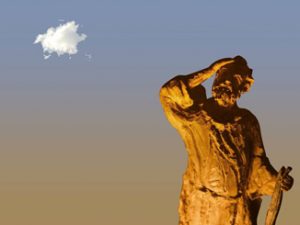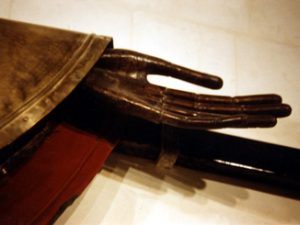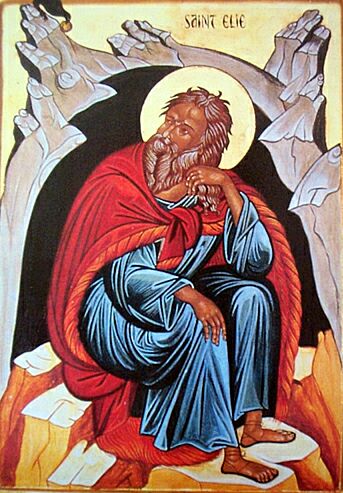In the history of Israel, the prophet Elijah lived at a time when the Chosen People had settled in the land of Canaan and had begun to forget God who had led them out of Egypt and turn to idols, the Baals. Seized by God who leads him to the desert, he goes back to the people and reveals the true God to them on Mount Carmel.
On Elijah, read 1 Kings 17—22, 2 Kings 1—2 and Ecclesiasticus 48.
What can this man with such odd clothes and such violent habits say to us today ? Society at the time of Elijah and our own society may seem very different. There are many spiritual people for whom a life of solitude can only be a dream without possibility of fulfilment. One person may be married and responsible for a family, the duties arising from this situation imposing on him absorbing daily tasks in the midst of the noisy world. Another may have an apostolic vocation outside the home and find himself involved in the many works which his eagerness has created or must at least maintain.
What practical lesson can we take from the epic of Elijah for the witness that we are called to give in the world ? A prophet is someone whom God has seized by a hold which leaves a taste of God in him, the thirst to be with him and to leave everything up to his will by a gift of self, so as to respond to the call of God wherever he sends him as a witness.
Thirst of God

To drink from the wellspring
The characteristic feature of this touch of God on the apostle is this taste for the absolute, this need for the absolute which can be found in him. « s Yahweh Sabaoth lives, whom I serve, I shall present myself to him today ! » (1 Kings 18.15) : he wants to remain in the presence of God.
This prophetic vocation is distinguished by the fact that the person whom God touches is thus oriented towards God and needs to become fixed in God by his gaze. Having experienced a bit of transcendence, he agrees to fix his gaze on this transcendence, he is hungry and thirsty for it. He has found the living God and wants to know this living God. So here there’s a need for silent prayer.
In solitude, an amazing conversation happens between God and the prophet. In this way the soul becomes a soul belonging to God, a soul whose main care and fundamental aspiration is the search for God, the presence of God, staying in the presence of God.
To repair the damage, wounds and weakness caused by a life of contact with the world and with other ways, other vocations and above all the evil of the world, the return to solitude is a bath that you take to purify yourself and live for a few moments in that vital element which is God.
God’s hold
What is theprophetic spirit ?

Elijah and the little cloud…
It’s essentially God’s hold on the prophet’s soul and even his body, on all he is and all he has. One day, God calls a man. He leaves everything, goes to the desert and there remains in the presence of God. The great contemplatives of all time and the instruments of God’s great works were led by him to the desert and formed there. So if you examine the prophetic vocation, you’ll see that it entails in principle a certain experience of God, a certain touch of God, whether conscious or unconscious, a certain manifestation of the transcendence of God which has revealed to the soul something of the absolute, has given it this taste and need for the absolute and makes it choose this absolute as its road, no longer as one day’s action in a temporary project, but as a way of perfection.
And that is nothing less than holiness. It’s what happened to the apostles on the day of Pentecost. They became the perfect instruments of the Holy Spirit, at his disposal, and at the same time they were sanctified by him, by his invading action.
Gift of self

Jesus Christ crucified hand
So that this need to gaze on God is not merely poetic or sentimental, so to speak, it needs to be accompanied by the decision to give everything to God, to make a complete gift of self.
The prophet understands that he can’t ask God to give himself and can’t remain in his presence unless he has given him everything. The prophet is constantly in search of God and constantly surrendered to his interior or exterior action. He surrenders and that’s his sole occupation. It’s up to God to use him by keeping him in solitude or sending him here and there. The prophet plunges into God, shutting his eyes to surrender to the all-powerful divine presence, the love of God. Indeed, God’s plan must be sought in darkness, for his thoughts surpass human thoughts as heaven surpasses the earth. The gift of self has to look for its vocation in mystery and offer itself to this mystery, which hides that vocation and keeps it jealously for the moment of truth.
The gift of self should be undetermined so as not to get lost in human constructs and to securely match divine reality and truth. This gift in view of an undetermined realization is not an attempt to commune with emptiness, it’s an effective gift to a divine will that is certain but as yet unknown. Once this undetermined gift has become a habit, it delivers the soul to the action of the Holy Spirit, a positive benefit that is second to none. It keeps the soul in an obscurity of faith and makes it attentive to the slightest manifestation of the divine will, sharpening its spiritual senses, which become sensitive to the delicate anointing of the Holy Spirit.
It’s true that the soul gets into this with all its faults, all its bad tendencies and all the sins of its past life, but none of that is an obstacle for making this leap into God. When you throw yourself into this obscurity by the gift of self, you necessarily fall into the mercy of God.
Witness
In the world (here, high speed railway station)
God chooses the prophet so that he bears witness. “I am full of jealous zeal for Yahweh”, proclaims Elijah (1 Kings 19.14, NJB). And for what ? To go to the modern world and its atheism, witnessing to God and the life of God.
God doesn’t just choose the prophet so that he remains in his presence, he does it to send him on a special mission, so that he bears witness to the existence of God and also to the life of God overflowing in him. How does he witness ? In his gestures and actions, and in the love which should overflow from gestures, words and attitude.
The harmony of this synthesis doesn’t derive from a wise dose of exterior activities and spiritual exercises.
- Every baptised person is called to live this experience of God which gives him this taste for the absolute.
- Because not everyone can live in the desert, you need to arrange segments of silence in your day and in your timetable so that you can deliver yourself to the transforming action of the Spirit.
- Presence to God and presence to the world can unite in a balanced harmony which purifies them and makes each enrich the other.
- It’s this perfect balance of contemplation and action which is the distinguishing feature of the prophet and marks out the perfect apostle.



